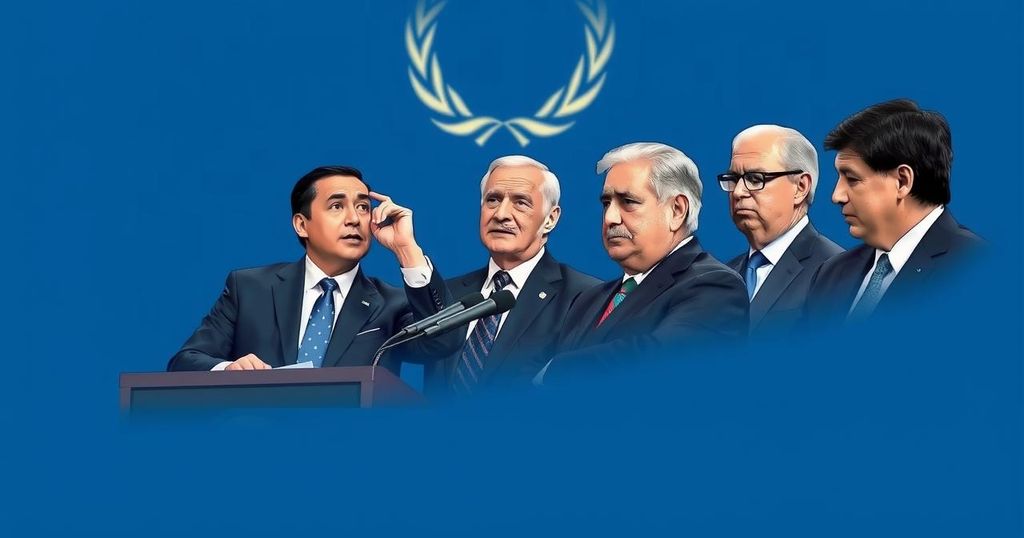Climate change
ALDEN MEYER, ASIA, AZERBAIJAN, BAKU, BELTRAN, BRAZIL, CLIMATE, CLIMATE CHANGE, E3G, ENVIRONMENTAL POLICY, GLOBAL WARMING, GREENHOUSE GAS EMISSIONS, INDIA, JENNIFER AND TED STANLEY, PALO, PALOMA, PALOMA BELTRAN, PRX, PUBLIC RADIO, SOUTH AMERICA, UNIVERSITY OF MASSACHUSETTS
Marcus Li
0 Comments
Overview of COP29: Urgency for Enhanced Climate Financing in Baku
Delegates from nearly 200 countries convene for COP29 in Baku, Azerbaijan, to address critical issues surrounding climate finance, particularly the need to establish a new global climate funding goal. The conference is marked by the absence of leaders from key high-emission nations, raising concerns about the effectiveness of negotiations amid escalating climate crises. Alden Meyer from E3G discusses the urgent financial needs for developing countries and the challenges posed by US political developments that could impact cooperation and commitments.
The 29th Conference of the Parties (COP29) to the UN Framework Convention on Climate Change commenced in Baku, Azerbaijan, with representatives from nearly 200 countries in attendance. Host Paloma Beltran engaged Alden Meyer from the climate think tank E3G to discuss the initial sentiments surrounding the conference, particularly the urgent discussions regarding climate finance. The need for a new financing framework to replace the previous commitment of $100 billion, which has been insufficient, is a critical concern among delegates. Notably, top leaders from major emitting nations such as the United States, Brazil, China, and India are conspicuously absent from these crucial talks, which raises further anxiety amidst escalating climate challenges. The gathering is set against a backdrop of intensifying climate crises, with many nations emphasizing the need for increased climate funding, particularly for developing nations. Meyer highlighted that the financing required is measured in trillions of dollars to adequately address issues of decarbonization, adaptation, and particularly loss and damages due to climate impacts. However, he expressed concerns that developed countries are not prepared to meet this escalating financial need, complicating the negotiations on how to effectively support vulnerable nations. Adding to the tension, the recent elections in the United States, potentially leading to a second Trump presidency, have induced uncertainty regarding U.S. participation at the conference and its commitments under the Paris Agreement. Meyer emphasized that the atmosphere remains tense as participants seek financial pledges, and he cited significant concerns that the necessary commitments to support global climate control will fall short. Additionally, he noted the gap between the $800 million pledged for loss and damage, compared to the tens of billions required, reflecting a troubling discrepancy that could undermine progress in climate negotiations. Overall, as COP29 progresses, the urgency for actionable commitments and international cooperation has never been greater amidst a rapidly changing climate.
The UN Climate Change Conference, or COP, is a pivotal meeting where countries convene to negotiate strategies and actions aimed at addressing climate change. This year, COP29 is particularly significant as it seeks not only to review the effectiveness of prior commitments but also to establish a new climate finance goal to supersede the previous $100 billion annual funding pledge. Given the alarming rise in climate-related disasters and a pressing need for adaptation efforts, the conference underscores the necessity for developed countries to mobilize substantial financial assistance to support developing nations in combating climate impacts and achieving their climate goals. The absence of major emitting nations’ leaders further complicates these discussions, highlighting a potential lack of commitment or urgency in addressing the climate crisis.
In conclusion, COP29 in Baku represents a critical juncture in global climate negotiations, focusing on the essential need for increased climate finance to support vulnerable nations struggling with the impacts of climate change. With a clear call for action emerging from numerous delegations, it is imperative that developed countries recognize their responsibilities and enhance their commitments to global climate efforts. Future cooperation and trust will hinge on the outcomes of this conference, particularly regarding financial pledges, as the world continues to grapple with an increasingly urgent climate crisis.
Original Source: loe.org




Post Comment